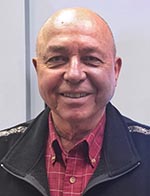Volunteer Spotlight:

Volunteer Pete Heddell, member of the council’s Port Operations and Vessel Traffic System committee, has seen a lot of changes in Prince William Sound and Alaska.
His parents brought him here at the age of three and a half, just 30 days after the Japanese attacked Pearl Harbor, where the family homesteaded outside of Homer on the Kenai Peninsula.
Heddell worked in the fishing business for several years before joining the state police in 1963. After his retirement in 1987, Heddell and his wife Marilynn, started their marine charter service, Honey Charters, out of the port of Whittier.
“We ordered the first of our four boats in the fall of 1987,” Heddell said. He and his wife spent that first summer exploring Prince William Sound.
“In March of 1989, we were on the floor at our first sportsman’s show when we heard the Exxon Valdez had hit Bligh reef.”
Their first summer in business was active, but not quite in the way they expected. Whittier was a hub of activity for the cleanup.
“Our first full season would have been the summer of 1989,” Heddell said. “But instead, we ended up with a contract on the cleanup as a medical safety boat.”
Oil shows up in unexpected places
Heddell recalls being surprised by some of the places the oil from the Exxon Valdez reached. Oil showing up in unexpected places prompted a closer look at the currents in Prince William Sound which rotate in an overall counter-clockwise direction.
“Some people knew it instinctively, but they hadn’t thought about it in relation to oil spills.”
Heddell says that lesson about the currents in Prince William Sound is still being studied by the council. These sea currents could affect the safe navigation of tankers through the Sound, and the ability to prevent, respond to, and clean up an oil spill.
The importance of working together
Heddell learned a different lesson from the recreational users, many of whom were in the oil industry, who hired the Heddells’ vessels to take them out into the Sound.
“It was educational for me, to listen to their conversations amongst themselves about improving the way they did business,” Heddell said. “It wasn’t all corporate greed, there was genuine concern that they were doing the right thing.”
Heddell says that the realization that everyone really wants to keep oil out of the water is an important lesson.
Heddell’s wife Marilynn joined the council’s board of directors in 1996, and shortly thereafter, council staffer LeAnn Ferry approached Heddell about joining the committee, where he has now served faithfully for over 15 years.
Heddell says the board and committees all went through a growth period and had to learn how to communicate with each other and also work hand-in-hand with the industry.
In the early days of the council, emotions were still high because people had just experienced a terrible disaster. These days, Heddell says things have calmed down.
“It’s not a lack of passion, the passion is still there,” he says “It’s honed itself down to a professional approach.”
“If they learn that you’ve done your homework and your research is valid, then you’ve got their attention. If you go in and pound on the table, then you lose them.”
Changing technologies
Heddell says that the technology on board both tugs and tankers has changed dramatically in recent years. He reads a lot just to stay informed on vessel-related technology news.
“The equipment that goes onto these vessels is the latest and greatest. What is interesting is that a company will build it, launch it, christen it, and then it’s old news because of the new technology that’s right behind it,” Heddell says.
“It comes back full circle,” he says. “It takes money to do this.” Heddell says with the declining amount of oil flowing through the pipeline, it could get harder to keep up with newer, safer technologies.
Heddell says communications and mapping have both vastly improved through modern technology.
“When we originally started up here, the northern half of the Sound, with the exception of the established tanker lanes, were all drawn in dotted lines, so you learned the location of the rocks and a lot of underwater hazards by visiting on minus tides,” he says. “You had to teach yourself the coast line.”
Now, all vessels have electronic charts and GPS on board.
“During the spill recovery effort, the communications that were brought in were excellent, but of course when those folks all went home, their equipment did too.” Slowly but surely communications have improved in the sound since then.
“Today, I think there’s still room for improvement,” Heddell says of the communications coverage in the Sound. He says that there are still areas where it’s still a struggle to even make a phone call. “The eastern side and Hinchinbrook Entrance are very well covered. As the fringes expand and get better, it’s going to improve the whole system.”
“I don’t want to sound like a broken record,” Heddell says. “It all goes back to the safe transportation of oil and whether you’re going to get a tanker in and out safely.”
Subscribe to The Observer!
Want to receive every issue of The Observer straight to your inbox? Subscriptions are free. Subscribe here: The Observer